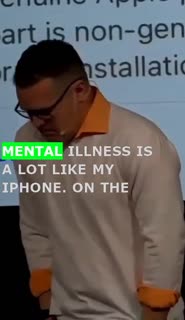Breaking the Silence: Embracing Mental Health in Faith
Summary
In today's message, I shared a deeply personal and challenging topic that often goes unspoken in our communities and churches: mental illness. Using the metaphor of my frequently dropped iPhone, which appears fine on the outside but is damaged internally, I highlighted how mental health issues often remain hidden beneath the surface. Many people suffer silently, fearing judgment or dismissal, especially within the church, where mental health discussions are often stigmatized or oversimplified with platitudes like "pray more" or "worship harder."
I emphasized the importance of creating a safe space within our church community where individuals can openly discuss their struggles without fear of judgment. Mental health issues, including depression and anxiety, are not signs of spiritual weakness. The Bible is filled with stories of individuals like Job, David, and Elijah, who experienced profound despair and anxiety. These stories remind us that it's okay to not be okay, but it's not okay to stay there. We must seek help and support from our community and God.
I also addressed the societal factors contributing to mental health struggles, such as the comparison culture fueled by social media and the increasing number of fatherless homes. These issues exacerbate feelings of inadequacy and isolation. As a church, we are called to fill the gaps, to be a community that supports one another, and to ask the simple yet profound question, "Are you okay?"
In closing, I challenged everyone to wear a green bracelet as a reminder to reach out to those around them and genuinely inquire about their well-being. We are all connected, and when one of us is struggling, it affects us all. Let us be a community that walks alongside each other, offering support and love, and may we be so close to God that we can hear His gentle whisper guiding us.
Key Takeaways:
- Hidden Struggles: Mental illness often remains hidden, much like internal damage on a seemingly intact phone. It's crucial to recognize that people may appear fine on the outside while struggling internally. We must create a safe space for open discussions about mental health without fear of judgment. [07:07]
- Biblical Examples: The Bible is filled with stories of individuals who faced depression and anxiety, such as Job, David, and Elijah. These stories remind us that experiencing mental health struggles does not make us less spiritual or distant from God. It's okay to not be okay, but we must seek help and support. [16:26]
- Societal Pressures: The comparison culture and the rise of fatherless homes contribute to mental health struggles. Social media often presents a highlight reel of others' lives, leading to feelings of inadequacy. As a church, we must fill the gaps and support those in need. [21:03]
- Community and Connection: Isolation can exacerbate mental health issues. Being part of a community can reduce anxiety and stress, strengthen our immune system, and increase longevity. We must prioritize connection and support one another in our struggles. [36:22]
- The Power of Asking: A simple question, "Are you okay?" can have a profound impact. We are all connected, and when one of us struggles, it affects us all. Let us be a community that genuinely cares for one another and walks alongside each other in love and support. [56:39]
Youtube Chapters:
- [00:00] - Welcome
- [01:01] - The Green Bracelet
- [02:19] - The Story of the iPhone
- [03:50] - Cracks in the Camera
- [05:21] - The Unknown Part
- [07:07] - Mental Illness and the Church
- [09:05] - The Stigma of Mental Health
- [12:01] - Statistics and Reality
- [14:00] - Stories of Pastors
- [17:24] - Biblical Examples of Struggle
- [21:03] - Comparison Culture
- [24:08] - Fatherless Homes
- [28:12] - The Selfie Generation
- [32:08] - Elijah's Story
- [36:22] - The Importance of Community
- [39:38] - God's Whisper
- [47:42] - The Green Bracelet Challenge
- [56:39] - We Are Connected
- [58:46] - Closing and Call to Action
Study Guide
Bible Study Discussion Guide
Bible Reading:
1. Job 30:16-22
2. Psalm 6:6-7
3. 1 Kings 19:3-4, 12
---
Observation Questions:
1. How does the metaphor of the iPhone relate to the hidden nature of mental illness as discussed in the sermon? [07:07]
2. What societal factors were mentioned in the sermon that contribute to mental health struggles? [21:03]
3. How did the sermon describe the role of community in addressing mental health issues? [36:22]
4. What was the significance of the green bracelet mentioned in the sermon? [47:42]
---
Interpretation Questions:
1. In what ways do the stories of Job, David, and Elijah illustrate that experiencing mental health struggles does not equate to spiritual weakness? [16:26]
2. How does the sermon suggest that societal pressures, like comparison culture, impact our mental health and spiritual well-being? [21:03]
3. What does the sermon imply about the importance of asking others, "Are you okay?" and how might this question impact someone's life? [56:39]
4. How does the sermon interpret the gentle whisper of God in 1 Kings 19:12, and what does it suggest about our relationship with God during times of struggle? [38:21]
---
Application Questions:
1. Reflect on a time when you felt like you had to hide your struggles. How might sharing your experience with a trusted community have changed your situation? [07:07]
2. The sermon mentioned societal pressures like social media. How do you personally navigate these pressures, and what steps can you take to reduce their impact on your mental health? [21:03]
3. Consider the role of community in your life. How can you actively contribute to creating a supportive environment for others who may be struggling? [36:22]
4. The sermon challenges us to ask others, "Are you okay?" How can you incorporate this practice into your daily interactions, and what might be the potential outcomes? [56:39]
5. Reflect on the biblical examples of Job, David, and Elijah. How do their stories encourage you to seek help and support during difficult times? [16:26]
6. The sermon discussed the importance of being close to God to hear His whisper. What practical steps can you take to draw closer to God, especially during challenging times? [38:21]
7. How can wearing a green bracelet serve as a reminder to reach out to others, and what specific actions will you take this week to support someone in need? [47:42]
Devotional
Day 1: Hidden Struggles Beneath the Surface
Mental illness often remains hidden, much like internal damage on a seemingly intact phone. It's crucial to recognize that people may appear fine on the outside while struggling internally. Many individuals suffer silently, fearing judgment or dismissal, especially within communities where mental health discussions are stigmatized or oversimplified. Creating a safe space for open discussions about mental health without fear of judgment is essential. By acknowledging these hidden struggles, we can foster an environment of understanding and support, encouraging those who are suffering to seek help and share their burdens. [07:07]
"Even in laughter the heart may ache, and the end of joy may be grief." (Proverbs 14:13, ESV)
Reflection: Think of someone in your life who may be struggling silently. How can you reach out to them today to offer support and understanding?
Day 2: Biblical Examples of Mental Health Struggles
The Bible is filled with stories of individuals who faced depression and anxiety, such as Job, David, and Elijah. These stories remind us that experiencing mental health struggles does not make us less spiritual or distant from God. It's okay to not be okay, but we must seek help and support. These biblical figures show us that even the most faithful can experience profound despair, and their stories encourage us to seek God's presence and the support of our community during difficult times. [16:26]
"I am feeble and crushed; I groan because of the tumult of my heart." (Psalm 38:8, ESV)
Reflection: Reflect on a time when you felt distant from God due to personal struggles. How can the stories of Job, David, or Elijah inspire you to seek God's presence today?
Day 3: Societal Pressures and Mental Health
The comparison culture and the rise of fatherless homes contribute to mental health struggles. Social media often presents a highlight reel of others' lives, leading to feelings of inadequacy and isolation. As a church, we must fill the gaps and support those in need, recognizing the societal factors that exacerbate mental health issues. By understanding these pressures, we can better empathize with those who are struggling and offer meaningful support and connection. [21:03]
"Let us not become conceited, provoking one another, envying one another." (Galatians 5:26, ESV)
Reflection: Consider how social media affects your self-perception. What steps can you take to focus on your own journey and reduce feelings of inadequacy?
Day 4: The Importance of Community and Connection
Isolation can exacerbate mental health issues. Being part of a community can reduce anxiety and stress, strengthen our immune system, and increase longevity. We must prioritize connection and support one another in our struggles. By fostering a sense of belonging and community, we can help alleviate the burden of mental health struggles and create an environment where individuals feel valued and supported. [36:22]
"Bear one another's burdens, and so fulfill the law of Christ." (Galatians 6:2, ESV)
Reflection: Identify one way you can contribute to building a supportive community within your church or social circle. How can you actively participate in bearing the burdens of others?
Day 5: The Power of Asking "Are You Okay?"
A simple question, "Are you okay?" can have a profound impact. We are all connected, and when one of us struggles, it affects us all. Let us be a community that genuinely cares for one another and walks alongside each other in love and support. By reaching out and asking this question, we open the door for meaningful conversations and demonstrate our commitment to supporting one another through life's challenges. [56:39]
"Therefore encourage one another and build one another up, just as you are doing." (1 Thessalonians 5:11, ESV)
Reflection: Think of someone you haven't connected with in a while. How can you reach out to them today and ask, "Are you okay?" to show your care and support?
Quotes
1. "Mental illness is a lot like my iPhone. On the outside, you look fine. On the outside, it looks like everything's going good. You don't see scrapes. You don't see bruises. You don't see scratches. It's all happening on the inside. And a lot of times, it's not happening on the inside. A lot of times, people that are going through the mental illness, they don't feel like they're sharing it. A lot of times, it's like, well, I don't want to burden somebody else with what I'm going through. So I don't want to put this on your plate, and it caused damage, or you stress about it. So instead, I just hang on to it, and it kills me from the inside." [07:27] (46 seconds)
2. "See, it's, I don't know, growing up in the church world, like I did, it's not something that we talked about a lot. Depression, anxiety. In fact, I've never sat where you're sitting and heard a preacher do a message on suicide before. Because it's like just something that we don't talk about. And why would we? Because a lot of times, the answers we get for that is stuff like, you need to pray more. Oh, you're depressed? You need to pray more. You have stress? You need to pray more. Oh, you got anxiety? You need to go to church more." [08:19] (40 seconds)
3. "We got the stigma in church that we just got to suffer with in silence. You know, oh, you're going through a hard time. You're depressed. Oh, you're just, you're not spiritual enough. I feel like somebody needs to hear this. You being depressed and you going through this does not make you any less spiritual or any less close to God. Just like being happy doesn't make you any more spiritual. See, here's the thing. It's okay to not be okay, but it's not okay to stay there because we're not supposed to stay there." [16:01] (49 seconds)
4. "Another reason I think that we're in the place that we're at with these growing numbers is because for the second generation in a row, the divorce rate is increasing, and more and more children are growing up in fatherless homes. And the statistics to this is insane. And I just want to throw this out there. You can be a father and actually in the house but not be present. These are statistics. This is from the U .S. Census. Those that grow up in a fatherless home. Those that grow up in a fatherless home are twice as likely to commit suicide." [24:02] (48 seconds)
5. "Another reason that I believe that we're in the place that we are in because we're in the selfie generation. And listen, I have no problem with you taking selfies. I'll be right there, match you selfie for selfie. No issue with that. But when I say a selfie generation, it's all about me, me, me. You don't believe me? Go to iTunes. Look up the top 100 songs on Apple Music. And you'll see such a huge percentage of them are all about me and what people can do for me. And I'm on top. I'm the best. Me, me, me, me. It's all about me." [27:49] (42 seconds)
6. "Instead of focusing on other people, asking you if you're okay, what he's telling us to do is start asking other people if they're okay. Okay? And here's the cool thing that will happen. You start asking people if they're okay and really listening and talking. Yeah? You will have more uhm more empathy and more humility. People around you than ever before because there's something about someone that really cares that just draws people in." [29:40] (36 seconds)
7. "And Elijah gets to the wilderness. He's by himself. He gets down. He gets depressed. He's like, he starts those comparison games. There's one point where he tells God, I'm the only one left. And God's like, no, you're not. You think that because you're by yourself in the wilderness. Like, if you sit in your room, and you're like, nobody's here for me. Yeah, because you're in your room. You've shut yourself away from everybody." [36:31] (30 seconds)
8. "And a lot of times, stuff starts happening in our lives, and we... Instead of getting closer to God, we get farther away, farther away. And then we wonder, why am I doubting all these things? Why is all this stuff happening? So, God's called us to community. I don't believe we wouldn't be here if he did. And I don't believe it's an accident that anybody's here. God's called you here. He's put you here for a reason." [39:31] (27 seconds)
9. "I think it's pretty awesome because I'm looking around and I see people having a difficult time connecting and then I see people helping them connect. You can connect to the same one that someone else is connected to if you need to. I mean, I'll get to this. I got snot running down my nose. I want you to look around. I want you to look around at the people that God's put in your life that's making that comment and that statement loud and clear. You are not alone." [58:13] (75 seconds)
10. "So my friends, my family, the awesome people at Fairlawn Church, may you be the one and may we be the people that ask, are you okay? Are you okay? May we find healing. May we find healing in community because that's how God created us. And may we be so close to God that we can hear Him whisper. Thank you for being a part of this. I love you." [59:22] (32 seconds)










